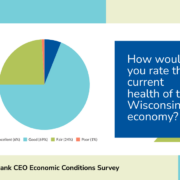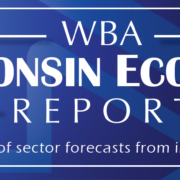Economic Report: Wisconsin is Headed for a Stronger 2024

By Tom Still, Wisconsin Technology Council
Mike Knetter, the nationally known economist who runs the UW Foundation, aptly describes it as “the economic expansion we love to hate.” It’s the notion that the U.S. economy has thus far dodged recession and is growing in tangible ways – but is still viewed with apprehension by many people.
A former economic advisor to two presidents, Wisconsin-native Knetter recently described the uncertain public attitude as shaped by a mix of encouraging factors — such as low unemployment, high payroll employment and prime-age workers returning to the labor force — and some cautionary trends. Those trends include inflation, high interest rates, lack of housing mobility, the growth of the national debt and fragile consumer confidence.
Layer in worries about conflict abroad, political polarization at home, reverse globalization and the stubborn reality that transitioning away from “carbon energy” won’t come easy, the picture of a “love-hate” relationship comes into focus in Wisconsin and nationally.
All in all, however, expect a stronger 2024 for Wisconsin’s economy.
“What!” you might exclaim. “Optimists like you think the Green Bay Packers will win the next Super Bowl, too.”
I’ll leave football forecasts to others, but Wisconsin is well-positioned for growth. Here are some reasons why:
- Technology, innovation and entrepreneurship are changing the state economy in ways that touch every sector, from agriculture to manufacturing, and from financial services to tourism. Artificial intelligence is a part of what will become the “fourth industrial revolution.”
- The Wisconsin economy is increasingly intertwined with what’s happening in tech markets. Companies such as Microsoft, Amazon, Google and Tesla all have a stake in the state in one form or another. As the need for data centers grows with AI, Wisconsin is a natural candidate to host them – assuming energy costs are controlled.
- Home-based tech companies continue to out-perform competitors. Epic Systems’ market share for electronic health records resembles Henry Ford’s dominance in the 1920s. Exact Sciences, Promega, Faith Technologies, SHINE Technologies, NorthStar Medical Radioisotopes and Rockwell Automation are among other examples.
- Wisconsin is well-positioned to take advantage of changes in agriculture, energy, water and manufacturing tech to make the world more resilient in the face of climate change. Two planning grants from the National Science Foundation (only 44 were awarded nationwide) speak to Wisconsin expertise in those sectors.
- The right-sizing of higher education in Wisconsin is underway. It will be painful to many but ultimately beneficial to an economy that needs all the talent it can get. Memo to Wisconsin Legislature: Part of right-sizing is approving UW buildings for the future.
- Early stage investing across the country declined in 2023, but indicators suggest young Wisconsin companies continued to attract money from venture and angel capitalists close to home and well beyond.
One factor to watch: In-migration. Will Wisconsin be among those states that benefit from the California exodus, which approached 343,000 people in 2022 alone? Lower regulatory hurdles, competitive taxes and quality of life can separate the state from natural competitors. Told often and well, the Wisconsin economic story can generate more love than hate.
Still is president of the Wisconsin Technology Council | The Wisconsin Technology Council is the independent, non-partisan science and technology advisor to the Governor and the Legislature.






